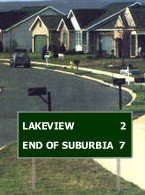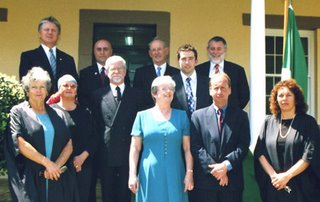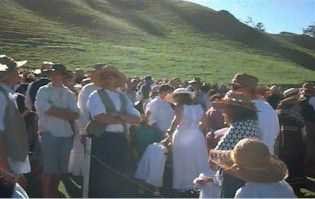LIFE IN THE SUBURBS
 Minister Lloyd told us in his phone/radio interview yesterday that he has single streets in his electorate with more people than live on Norfolk Island.
Minister Lloyd told us in his phone/radio interview yesterday that he has single streets in his electorate with more people than live on Norfolk Island.So what can we imply from this?
We are too small and insignificant to be worth worrying about?
Well, we do not see it that way. Our community is very important to us. We are well aware that Norfolk Island, being an anomaly, has only nuisance value for Canberra and DOTARS. We don't really expect others to see us as important to their lives. Just leave us to get on with things our way.
We cannot possibly organise ourselves into a viable and self-sufficient community with our own laws and methods of managing our affairs?
On the contrary, I believe we have proved we can. In those early years after the mutiny, and the initial violence, the Pitcairners could easily have "gone feral" and wiped themselves out altogether. But they didn't...they organised themselves into a productive and positive little group of people, and laid the foundations for a society, indeed, a small nation, that has remained strong, well-ordered, resilient. A people with a sound set of values, a sense of rootedness, belonging and empowerment. A people that is diverse, yet cohesive. A people that is contented and relaxed, but prepared to work hard for what it wants and needs. And above all, a people that wants to continue to manage its own affairs for the benefit of the people who belong to it.
 Big is better?
Big is better?On that basis, New South Wales is better than Tasmania, The U.S.A. is better than Australia, China and India are better than the U.S.A.....you could go on making comparisons. But we all know it is not necessarily so!!!
It is all a question of cutting your coat to suit your cloth, and working out a system to suit your needs and your size. Here on Norfolk Island, much of our problem has been that we have had big-government "solutions" imposed on us to meet small local island needs and problems.
If our government has become too complex, it is because Australia has demanded that it be so.
Drawing us into the Australian system will only make our government and our lives more complex and unweildy.
We need to be "normalised" into the Australian suburban model?

There is no better place in the world than Norfolk Island. We love living here. We love being different. We have evolved a very special way of life that suits us. We do not expect others to fit into our pattern of life...although we are sure we can teach them a lot about getting your priorities right! We are incredibly proud of our uniqueness, our special heritage, our beautiful island home.
Much has been said in recent days about the criteria for prospective immigrants into Australia. The PM says that people migrating to Australia should be prepared to accept Australian values, customs, laws and also speak some English!
Well, what about Norfolk laws, customs and values? Don't they mean anything? Do you really want to wipe those things out with the stroke of a pen? Why are Australian ways and laws better for us than ours?
Please do not try to fit Norfolkers into your little suburban boxes!

























